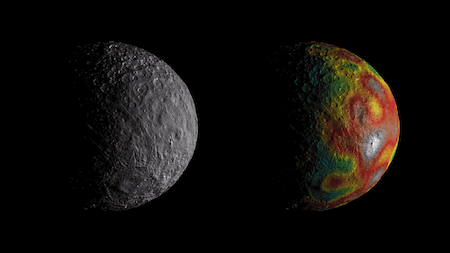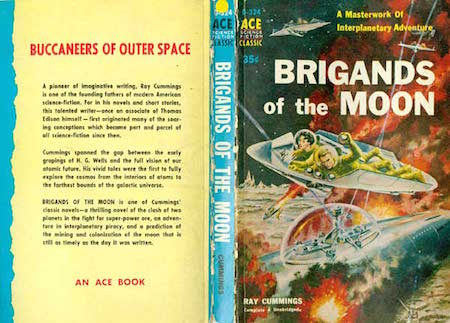Science Fiction
Dictionary
A B C D E F G H I J K L M N O P Q R S T U V W X Y Z
Ancient Ocean On Ceres?

Ceres is the largest object in the asteroid belt that lies between the orbits of Mars and Jupiter. It is approximately 587 miles in diameter and the 33rd largest known body in the solar system.
Is it possible that this small world, a dwarf planet, might have had ancient water oceans in the distant past? NASA's Dawn mission scientists think so.
The Dawn team found that Ceres' crust is a mixture of ice, salts and hydrated materials that were subjected to past and possibly recent geologic activity, and that this crust represents most of that ancient ocean. The second study builds off the first and suggests there is a softer, easily deformable layer beneath Ceres' rigid surface crust, which could be the signature of residual liquid left over from the ocean, too.
"More and more, we are learning that Ceres is a complex, dynamic world that may have hosted a lot of liquid water in the past, and may still have some underground," said Julie Castillo-Rogez, Dawn project scientist and co-author of the studies, based at NASA's Jet Propulsion Laboratory, Pasadena, California.
By modeling how Ceres' crust flows, Fu and colleagues found it is likely a mixture of ice, salts, rock and an additional component believed to be clathrate hydrate. A clathrate hydrate is a cage of water molecules surrounding a gas molecule. This structure is 100 to 1,000 times stronger than water ice, despite having nearly the same density.
The researchers believe Ceres once had more pronounced surface features, but they have smoothed out over time. This type of flattening of mountains and valleys requires a high-strength crust resting on a more deformable layer, which Fu and colleagues interpret to contain a little bit of liquid.
The team thinks most of Ceres' ancient ocean is now frozen and bound up in the crust, remaining in the form of ice, clathrate hydrates and salts. It has mostly been that way for more than 4 billion years. But if there is residual liquid underneath, that ocean is not yet entirely frozen. This is consistent with several thermal evolution models of Ceres published prior to Dawn's arrival there, supporting the idea that Ceres' deeper interior contains liquid left over from its ancient ocean.
Minerals containing water are widespread on Ceres, suggesting the dwarf planet may have had a global ocean in the past. What became of that ocean? Could Ceres still have liquid today? Two new studies from NASA's Dawn mission shed light on these questions.

(JPL animation; color map shows structure from gravity measurements)
There are stories from the Golden Age of science fiction that do not recognize all of the realities of life in space that we know so well in the 21st century - in particular, the unlikelihood of small bodies like asteroids with an atmosphere. Now that there might be some evidence for oceans on Ceres, we might need to take a look at some of those lost classics.
One such is the wonderful Brigands of the Moon by Golden Age great Ray Cummings.
Within the hour I had us dropping into the asteroid's atmosphere. The ship heated steadily. The pressure went up. It kept me busy with the instruments and the calculations. But my signals were always promptly answered from below. The brigand crew did its part efficiently.At a hundred and fifty thousand feet I shifted the gravity plates to the landing combinations, and started the electronic engines...
The electronic streams flowed out like a rocket tail behind us. The Planetara caught their impetus. In the rarefied air, our bow lifted slightly, like a ship riding a gentle ground swell. At a hundred thousand feet we sailed gently forward, hull down to the asteroid's surface, cruising to seek a landing space.
A little sea was now beneath us. A shadowed sea, deep purple in the night down there. Occasional verdurous islands showed, with the lines of white surf marking them. Beyond the sea, a curving coastline was visible. Rocky headlines, behind which mountain foothills rose in serrated, verdurous ranks. The sunlight edged the distant mountains; and presently this rapidly turning little world brought the sunlight forward.
It was day beneath us. We slid gently downward. Thirty thousand feet now, above a sparkling blue ocean. The coastline was just ahead; green with a lush, tropical vegetation. Giant trees, huge-leaved. Long, dangling vines; air[102] plants, with giant pods and vivid orchidlike blossoms.
I sat at the turret window, staring through my glasses. A fair, little world, yet obviously uninhabited. I could fancy that all this was newly sprung vegetation. This asteroid had whirled in from the cold of the interplanetary space, far outside our solar system. A few years ago—as time might be measured astronomically, it was no more than yesterday—this fair landscape was congealed white and bleak with a sweep of glacial ice. But the seeds of life miraculously were here. The miracle of life! Under the warming, germinating sunlight, the verdure had sprung.

(Brigands of the Moon, 1931)
Via JPL; thanks to Winchell Chung (@nyrath) of Atomic Rockets.
Scroll down for more stories in the same category. (Story submitted 10/30/2017)
Follow this kind of news @Technovelgy.| Email | RSS | Blog It | Stumble | del.icio.us | Digg | Reddit |
Would
you like to contribute a story tip?
It's easy:
Get the URL of the story, and the related sf author, and add
it here.
Comment/Join discussion ( 0 )
Related News Stories - (" Space Tech ")
The New Habitable Zones Include Asimov's Ribbon Worlds
'...there's a narrow belt where the climate is moderate.' - Harl Vincent, 1931.
Will Space Stations Have Large Interior Spaces Again?
'They filed clumsily into the battleroom, like children in a swimming pool for the first time, clinging to the handholds along the side.' - Orson Scott Card, 1985.
Reflect Orbital Offers 'Sunlight on Demand' And Light Pollution
'I don't have to tell you about the seven two-mile-diameter orbital mirrors...'
Chrysalis Generation Ship to Alpha Centauri
'This was their world, their planet —
this swift-traveling, yet seemingly moveless vessel.' - Nat Schachner, 1934
Technovelgy (that's tech-novel-gee!) is devoted to the creative science inventions and ideas of sf authors. Look for the Invention Category that interests you, the Glossary, the Invention Timeline, or see what's New.
Science Fiction
Timeline
1600-1899
1900-1939
1940's 1950's
1960's 1970's
1980's 1990's
2000's 2010's
Current News
The New Habitable Zones Include Asimov's Ribbon Worlds
'...there's a narrow belt where the climate is moderate.'
Can One Robot Do Many Tasks?
'... with the Master-operator all you have to do is push one! A remarkable achievement!'
Atlas Robot Makes Uncomfortable Movements
'Not like me. A T-1000, advanced prototype. A mimetic poly-alloy. Liquid metal.'
Boring Company Drills Asimov's Single Vehicle Tunnels
'It was riddled with holes that were the mouths of tunnels.'
Humanoid Robots Tickle The Ivories
'The massive feet working the pedals, arms and hands flashing and glinting...'
A Remarkable Coincidence
'There is a philosophical problem of some difficulty here...'
Cortex 1 - Today A Warehouse, Tomorrow A Calculator Planet
'There were cubic miles of it, and it glistened like a silvery Christmas tree...'
Perching Ambush Drones
'On the chest of drawers something was perched.'
Leader-Follower Autonomous Vehicle Technology
'Jason had been guiding the caravan of cars as usual...'
Golf Ball Test Robot Wears Them Out
"The robot solemnly hit a ball against the wall, picked it up and teed it, hit it again, over and again...'
Boring Company Vegas Loop Like Asimov Said
'There was a wall ahead... It was riddled with holes that were the mouths of tunnels.'
Rigid Metallic Clothing From Science Fiction To You
'...support the interior human structure against Jupiter’s pull.'
Is The Seattle Ultrasonics C-200 A Heinlein Vibroblade?
'It ain't a vibroblade. It's steel. Messy.'
Roborock Saros Z70 Is A Robot Vacuum With An Arm
'Anything larger than a BB shot it picked up and placed in a tray...'
A Beautiful Visualization Of Compact Food
'The German chemists have discovered how to supply the needed elements in compact, undiluted form...'
Bone-Building Drug Evenity Approved
'Compounds devised by the biochemists for the rapid building of bone...'
